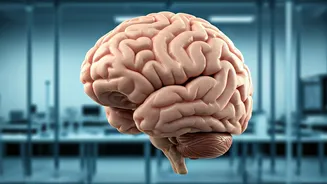Gendered Health Realities
Alzheimer's disease, a progressive neurological disorder, casts a longer shadow over women, a fact increasingly supported by scientific evidence. This
isn't merely a matter of lifespan; women display a heightened susceptibility to the disease, presenting a critical public health concern. While factors such as longevity play a role, research is unearthing deeper biological distinctions that explain this gender imbalance. Exploring these differences is not just academic; it paves the way for a more targeted approach to prevention, diagnosis, and treatment, improving the lives of countless individuals and families. The impact of Alzheimer's on women extends far beyond the individual, influencing societal structures and caregiving responsibilities.
Subtle Brain Disparities
The brain, a complex organ, subtly evolves with age, displaying gender-specific variations that influence the risk of Alzheimer's. While not fully understood, these differences appear as the brain ages. Researchers are investigating the roles of hormones, particularly estrogen, in influencing brain health. Estrogen's neuroprotective effects might decline with menopause, leaving women more vulnerable to cognitive decline. The interplay of genetics and lifestyle is also being examined, aiming to clarify how these factors intersect with biological variations to boost or reduce risk. A holistic approach that acknowledges these multifaceted influences will be vital in crafting personalized strategies for brain health across genders, understanding that these patterns are not simple or singular, but a complex tapestry of biological processes.
Hormonal Influences Analyzed
Hormones, the body's chemical messengers, play a pivotal role in brain health, particularly in women. Estrogen, crucial during reproductive years, holds neuroprotective properties, supporting cognitive functions. The decline in estrogen during menopause could potentially accelerate the onset of Alzheimer's. Research efforts concentrate on understanding how hormonal changes influence the development of amyloid plaques and tau tangles, hallmarks of the disease. Furthermore, the interplay between hormonal changes and genetic predisposition is examined to provide a comprehensive understanding. This area of study is extremely important as scientists attempt to understand the complexity, and it aims to reveal the potential of hormone replacement therapies or other hormone-related interventions to reduce the risk or delay the onset of Alzheimer’s.
Future Research Directions
The quest to understand Alzheimer's risk in women pushes scientists towards innovative research approaches. They concentrate on refining diagnostic tools to detect early signs of the disease. The development of biomarkers which pinpoint specific brain changes before symptoms manifest allows for more effective interventions. The emphasis is on understanding the interaction of biological and social influences. More robust, diverse studies are vital to represent the varied experiences of women from diverse backgrounds. A deeper understanding of the gender-specific mechanisms will pave the way for treatments, ultimately benefiting both women and men affected by the disease. This proactive research is the path forward in the fight against Alzheimer’s.













